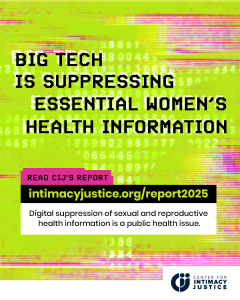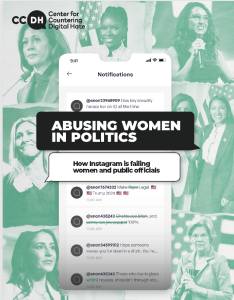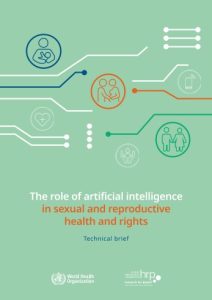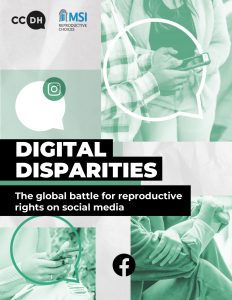Tag: Digital Rights

resources / Center for Intimacy Justice
The Digital Gag: Suppression of SRHR information on Meta, TikTok, Amazon, and Google
by Share-Net IntlOn February 28, 2025, the Center for Intimacy Justice released the most comprehensive publicly available investigation to date on Big Tech’s suppression of sexual and reproductive health information for women and people of diverse genders. They analyzed 146 survey responses and 21 qualitative interviews–for a total of 159 nonprofit organizations, content creators/sex educators, and businesses– […]
Learn More
resources / Centre for Countering Digital Hate
Abusing women in politics: New research from the Center for Countering Digital Hate
by Share-Net IntlHow Instagram is failing women and public officials Content warning: Racism, Violence, Sexual Assault. From the Center for Countering Digital Hate (CCDH) New research by the CCDH shows that Instagram failed to act on 93% of the abusive comments targeting high-profile US women politicians we reported, including death and rape threats. Meta’s Instagram is becoming […]
Learn More
resources / MSI Reproductive Choices
VPN – Vagina Privacy Network; let your private parts stay private online
/ by Share-Net IntlYour body is your business — and no one else’s. And it’s your right to access the information you need to make choices about your body and your future. Today, if you’re searching for abortion care or reproductive health information online, it will often leave a digital trail. But there are steps you can take […]
Learn More
resources / WHO
The role of artificial intelligence in sexual and reproductive health and rights
/ by Share-Net Intl | Leave a CommentOverview This technical brief provides an overview of the landscape surrounding the use of artificial intelligence (AI) in sexual and reproductive health and rights (SRHR), and highlights the related risks, implications and policy considerations. Considering the rapidly evolving nature of AI, this brief seeks to provide clarity in understanding how AI is being applied in SRHR […]
Learn More
resources / Digital Rights Foundation
Cyber Harassment Helpline Report 2023
/ by Share-Net Intl | Leave a CommentThe Digital Rights Foundation has released their 2023 Cyber Harassment Helpline Report, sharing they saw a surge in cases of Technology-Facilitated Gender-Based Violence (TFGBV) in Pakistan, receiving nearly 2500 cases in 2023 alone. The report captures recommendations and insights to combat TFGBV and build on institutional frameworks for supporting survivors. Read the full report here.
Learn More
resources / Centre for Countering Digital Hate, MSI Reproductive Choices
Digital Disparities: The global battle for reproductive rights on social media
/ by Rhian Farnworth | Leave a CommentA new report released by the Centre for Countering Digital Hate (CCDH) and MSI Reproductive Choices has found that tech platform, Meta, is restricting information on reproductive care in Africa, Asia and Latin America, while allowing and promoting ads sharing anti-choice misinformation and conspiracy theories. Researchers found that Meta and Google restrict local reproductive health […]
Learn Moreresources / Sexual and Reproductive Health Matters
Missed period? The significance of period-tracking applications in a post-Roe America
by Share-Net IntlPeriod-tracking applications (apps) have been perceived positively as a health literacy tool that increases menstrual and bodily awareness, thereby empowering users to better prepare for future periods, engage in conversations with healthcare providers, and monitor their bodies and sexual activity to be able to achieve their family planning goals. Period-tracking apps are part of a […]
Learn Moreresources / Sexual and Reproductive Health Matters
Digital privacy is a sexual health necessity: a community-engaged qualitative study of virtual sex work and digital autonomy in Senegal
/ by Share-Net IntlAbstract The COVID-19 pandemic highlighted the harm reduction potential of virtual sex work (VSW) such as video or audio calls with clients. VSW limits exposure to COVID-19 and STIs. However, sex workers using digital technologies face high risks of technology-facilitated intimate partner violence (IPV), such as non-consensual distribution of intimate images. This study explored perceived […]
Learn More